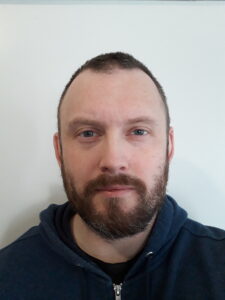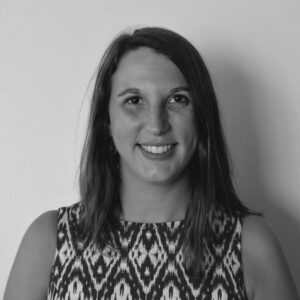
Martin Sjøgård, Ph.D. received his Ph.D. in Medicine at the Université Libre de Bruxelles. His Ph.D. work examined methods for characterizing and interpreting electrophysiological resting-state networks using MEG, and their relationship to cognition in multiple sclerosis patients. Before that, he completed an M.Sc. in Neuroscience at the Norwegian University of Science and Technology, where he used fMRI to investigate spatial representations in the medial prefrontal cortex. He joined the lab as a postdoctoral fellow in 2021 and is currently using EEG and MEG to investigate the role of brain oscillations in waking and sleep-dependent memory consolidation.
Paige Hickey, Ph.D. received her Ph.D. in Psychology from Tufts University in 2022. Her doctoral work explored how rhythms in the environment, such as music, influence attention and memory through the coordination of neural oscillations. Prior to completing her Ph.D., she was also involved in research at Boston Children’s Hospital, where she administered neuropsychological assessments to individuals and families with Autism Spectrum Disorder (ASD). She joined the lab in 2022 as a Postdoctoral Fellow and is investigating neural oscillations across wake and sleep in ASD using EEG.
Jing Zhang, Ph.D. received her Ph.D. in cognitive science from the University of California Irvine in 2023. Her doctoral work focused on how sleep spindles and slow oscillations contribute to different memory domains using multimodal brain-imaging techniques. Before graduate school, she was a research coordinator at the University of Maryland, Baltimore, where she researched biomarkers for chronic pain. She joined the lab in 2023 as a Postdoctoral Fellow and is investigating how different brain oscillations contribute to memory in the healthy population and patients with schizophrenia using EEG, fMRI, and MEG.

Emily Schwartz, Ph.D. received her Ph.D. in Cognitive Neuroscience from Boston College in 2024. Her doctoral work focused on social perception, leveraging neuroimaging and computer vision to quantitatively measure how visual representations of social stimuli, such as faces, are transformed along the processing stream in both the brain and deep convolutional neural networks. Prior to graduate school, she worked as a research assistant at Albert Einstein College of Medicine, conducting fMRI studies on individuals with mild cognitive impairment. She joined the lab in 2024 as a Postdoctoral Fellow, where she is investigating neural replay in both healthy and clinical populations.


